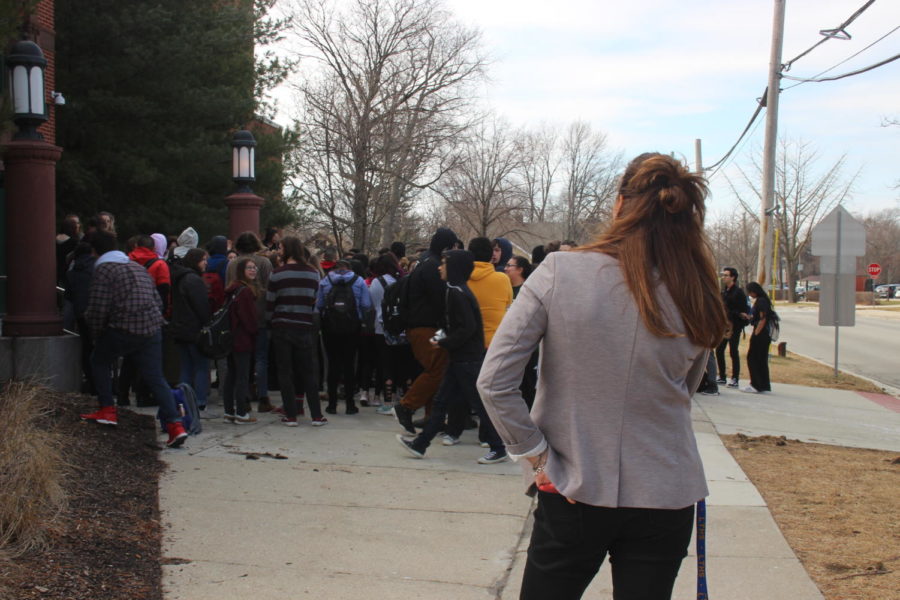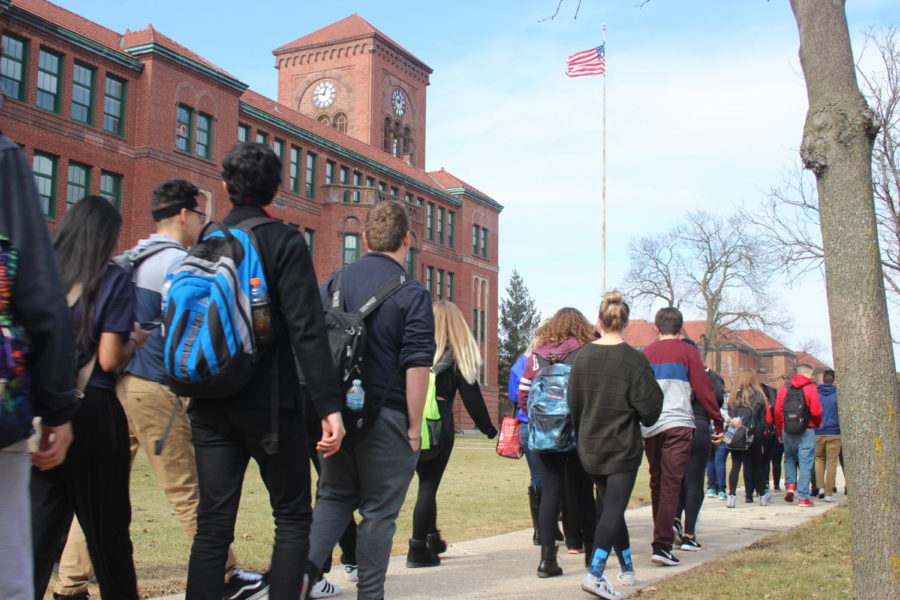LT protest presses for gun control in walkout
February 23, 2018
Students at SC walked out of class on Feb. 21 in order to call for gun control measures in the wake of the murder of 17 students at Marjory Stoneman Douglas High School in Parkland, Florida. Students at NC did the same on Feb. 22.
“We as students have a moral obligation to ensure that future generations of students are safe,” NC protester Ana Nix said. “Whether that action is going to happen now with gun reform, I think it is important to get out there and acknowledge it is a problem.”
After many school shootings throughout the past few years, the shooting in Parkland was the tipping point for many advocates.
“We’ve kind of put this issue off too long and we really need to do something,” protester Ray Berg ‘19 said.
Students walked-out during the passing period between fifth and sixth hour, assembling in front of the main NC entrance on Cossitt Avenue. Students gave speeches about the need to implement more gun regulations, and eventually began to march around the building.
As students peered out the windows of their classrooms—where they hoped to catch a glimpse of the demonstration down below—protesters waved to their fellow students, often attempting to encourage them to join the demonstration.
After circling the campus two times, the NC protesters controversially began to march through the halls of NC, some banging on lockers and chanting loudly.
“I don’t know if we made the right decision when we were walking through the hallways, because I know a lot of students and teachers found it a somewhat disrespectful because we were in their space,” Nix said. “Maybe we could have just marched outside. I think we should have had a clear start and ending.”
Additionally, the NC march took place on a day where gun safety was at the forefront of many students’ minds. Earlier in the day, Principal Brian Waterman informed students over the PA that the administration had received reports of a potential threat that was later determined to be unsubstantiated.
Later on in the day, it was also announced that—while the threat was meritless—the administration decided to cancel the annual All-school Assembly out of an “abundance of caution,” particularly for students “emotional well-being.”
On top of the caution, the protest may not have helped.
“It is out of an abundance of caution for our students’ emotional well-being, as well as the nature of our current climate, that I have made the decision to cancel the All-school Assembly scheduled for Friday,” Waterman said an email to staff.
Some students have blamed the demonstration for causing the cancellation of the assembly as—according to those knowledgeable about the internal-discussions—Waterman was confident that there would not be any significant risk to students’ physical safety.
Administrators were present as students protested. They trailed around 50 or so feet behind the demonstrators. Both Associate Principal Kevin Brown and Assistant Principal Kris Costopoulos declined to comment to whether or not there will be disciplinary action taken against the students who were involved.
Even if there are potential repercussions, both Berg and Nix thought that it was worth it.
Echoing his AP US History teacher, Berg said that any repercussions they may be subjected to is a critical part of the protest itself.
“The punishment really comes as part of the protest,” Berg said. “If you are punished for what you believe in, then that is half of the protest right there.”
Echoing Berg, Nix said that “there is risk” to fighting for your beliefs. Nix implored administrators not to take strict punitive measures against participants, because it would disincentive “students to participate locally,” she said.
“Not allowing us to clearly express our voice would show they don’t value the students,” Nix said. “If students were punished for being apart of this majority voice, I think it would reflect badly on the school.”
While there were those who held ardent beliefs regarding gun control, Sophie De Sa e Silva ‘18 said that the march’s spontaneity was the event’s Achilles heel.
“Because it was so spontaneous, it didn’t show much and was just a reason for people to get out of class,” Silva said. “Me and a few other people definitely knew what was going on, but I think there were definitely a lot of people who didn’t.”
While she admitted that there were most certainly some who attended the march for the wrong reasons, Nix disagreed with the notion that the majority of participants just went to skip class.
“I remember—when we were walking—I heard people talking specifically about what is wrong with the lack of gun control,” Nix said. “I saw a lot of people actually having discourse over the issue while I was marching.”
Ever since the the shooting occurred at Parkland, many the students have been vociferously calling for new gun regulation. Feb. 21, the same day of the SC walkout, students from Parkland were in Tallahassee, Florida, to lobby state politicians in Florida to pass more stringent gun regulations.
Even if the march at LT does not directly create legislative change, protester Mark DeWeese ’19 argued that the demonstration did its intended purpose.
“We caused this conversation,” DeWeese wrote on Instagram. “We May not be able to make direct change, but indirectly we spread our messages. We are hurting.”
A 17-minute silent walkout is scheduled nationally for March 14 and April 20 aiming to push for greater gun regulation.





















![Movie poster for '[Rec]" (2007).](https://www.lionnewspaper.com/wp-content/uploads/2023/04/rec-640x900.jpg)




